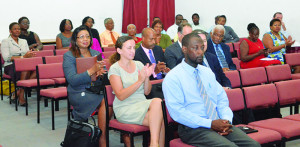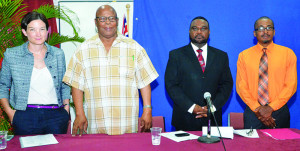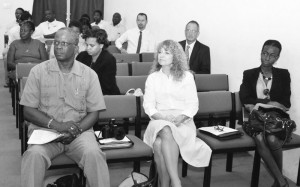
Officials in the Ministry of Finance, other Ministries and several regional and international partners, began a three-day meeting in Anguilla on Wednesday to examine the island’s fiscal and economic position and to consider the way forward.
The meeting, chaired by Mr Foster Rogers, Permanent Secretary, Economic Development, was referred to as the “Medium Term Economic Strategy 2010-2014 Annual Review 2-4 April 2014”.
The above-mentioned partners comprised representatives of the OECS, CARICOM, Caribbean Development Bank, World Bank, European Union and the IMF.
Permanent Secretary, Finance, Dr Aidan Harrigan, observed, in his welcome remarks, that Anguilla had begun experiencing negative economic growth from 2008 when the global financial situation took a dive, with little improvement occurring over the following years. He also referred to the banking crisis in Anguilla as part of the local financial situation, and the need to rebuild and reconstruct the island’s economy by putting together something that was more resilient to achieve that.

Dr. Aidan Harrigan
Governor Christina Scott was confident that the Government was committed to delivering a prosperous and stable future for the people of Anguilla, based on the implementation of sound and sustainable economic and financial principles.
She was of the view that the commitment was perhaps best illustrated by the passing of the Fiscal Responsibility Act to strengthen responsible fiscal management and improve fiscal transparency. She noted that there were some encouraging signs of the turning of the economic corner evidenced by a number of factors including increased tourism arrivals; investments in tourism projects; the planned implementation of infrastructure with respect to roads, improvements to schools; and the building a fire station.

The Governor said there was a need to get Anguilla back to fiscal stability and economic growth, and that a greater planning period was needed for the development of the island – probably covering up twenty years. She advised that there was an urgent need to address the crime situation on the island to avoid a turning away of investors, and she outlined a number of future objectives which could carry the island forward.
Chief Minister and Minister of Finance, Hubert Hughes, who spoke briefly, said the annual review was a very optimistic exercise because it was an indication that there was formal action involved in the Government’s planning processes. “There must always be that sense of awareness as it relates to the current state of affairs, as well as the historical state of affairs, and there is no other way of accomplishing that than by having a review such as this,” he stated.
Mr Hughes was impressed by the comprehensive scope of the three-day review programme. “I am thrilled that it is taking place in the public domain so that a variety of voices can be heard,” he added. “Anguilla may be at the crossroads, but we refuse to be crippled by fear…Nothing is being left to chance. This is a responsible and commendable approach and it speaks volumes of how dedicated the Ministers and public servants are.”
Wednesday’s review sessions, presented by various public servants, dealt with the following subject areas: a review of Anguilla’s economic and financial performance; managing debt collections; strengthening of the budget planning and preparation process; framework for fiscal and sustainable development; Anguilla’s national development plan; the importance of quality data; planning for infrastructure development in Anguilla; Implementation of Anguilla’s Sustainable Tourism Master Plan; a review of the 2013-2014 tourism winter season; promotion of financial services in Anguilla; small business development; a review of foreign direct investment projects and promotion activities; and interventions by the partners of Anguilla mentioned above.
A number of other subject areas, not listed on Wednesday, were arranged for Thursday and Friday for delivery by other public servants.










